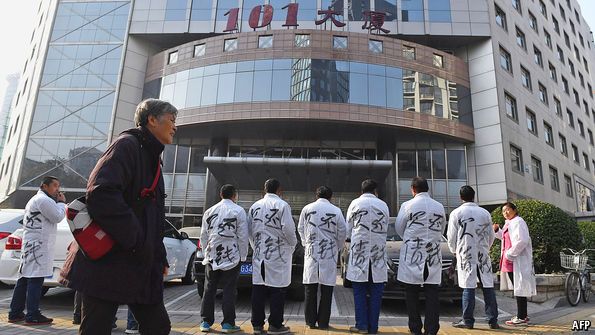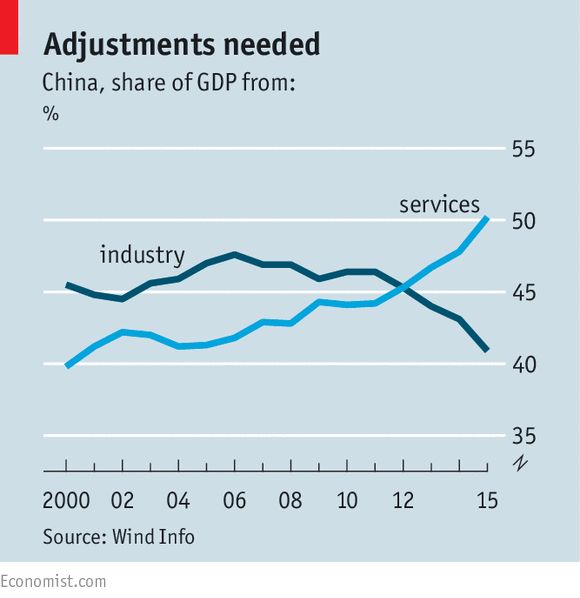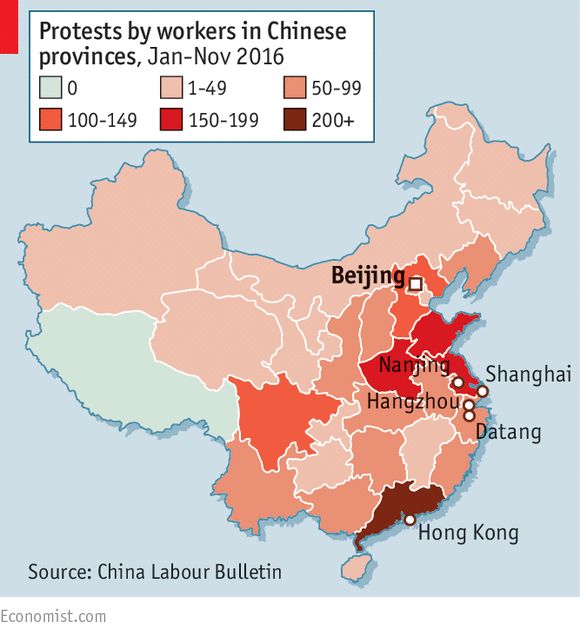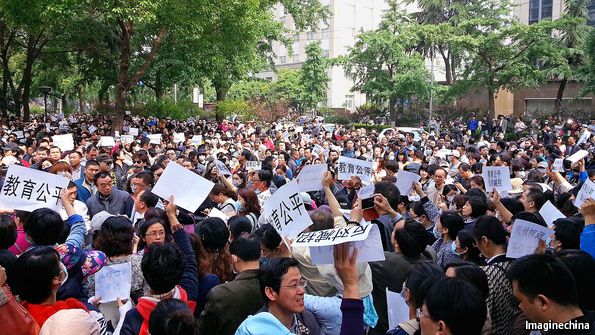China has gained hugely from globalisation
So why re its workers unhappy? Dec 10th 2016 中国从全球化收益颇丰,为何工人们却不开心
原文 http://www.economist.com/news/china/21711508-so-why-are-its-workers-unhappy-china-has-gained-hugely-globalisation
LI DONGSHENG, who is 35, says he is too old to learn new skills and too old to get married. Construction and factory work used to be plentiful, he says, as he eats his lunch from a yellow plastic container while sitting on a wall outside a jobcentrein Hangzhou, a city on China’s wealthy eastern seaboard. But these days he can rarely find even odd jobs. He sleeps rough and has not visited his parents, who live hundreds ofkilometresinland, for two years. Millions of people likeMrLi have powered China’s rise over the past three decades, working in theboom-townsthat have prospered thanks to China’s enthusiastic embrace ofglobalisation. Yet many are anxious and angry.
李东升今年35岁,说自己年纪太大学不了新技能也难找到媳妇。李先生站在杭州就业中心外的一面墙上,吃着用黄色塑料盒装的午餐。杭州是中国东部沿海一座富裕的城市。以前工厂和工地的招工很多,但他最近却很难找到工作,哪怕只是临时工。李先生露宿街头,已经两年没回百里外的老家看望父母。成千上万像李先生这样的人在过去的三十年支持了国家的崛起,正是因为积极拥抱全球化才得以在新兴城镇打拼。然而他们现在却很焦虑和愤怒。
Factory workers in America and Europe often blame China for stealing their jobs. There is no doubt that China has benefited enormously from its vast pool of people, likeMrLi, who are willing to work for a fraction of what Western counterparts might earn. Since 1979 China’s transformation into the workshop of the world has helped lift hundreds of millions of Chinese out of poverty.
欧美工厂的工人经常指责中国人抢走了他们的工作。中国毫无疑问享受了巨大的人口红利,像李先生这样的中国人愿意只获得同样工作西方人收入的一小部分。中国从1979年开始转型参与世界分工,这帮助了数百万人脱离贫困。
Yet many of the worries that have recently animated Western voters are common in China, too. Working-class Chinese, as well as members of the new middle class, fret about rising inequality, the impact of mass migration from the countryside into cities and job losses. “China will not shut the door to the outside world but open more,” said the president, Xi Jinping, in November. But even globalisationis occasionally attacked. On December 6th Global Times, a jingoistic newspaper published in Beijing, ran an opinion piece blaming globalisation for China’s income inequality, housing bubbles and the ravaging of its environment.
近来让西方公民担心的情况在中国也很常见。工薪阶层和新兴中产阶级担心:不断加剧的不平等;大量人从农村涌入城市的影响以及就业机会的减少。主席在11月说“中国开放的大门永远不会关上只会越开越大”。即便全球化偶尔会受阻。环球时报是北京的一家强势报纸,10月6号发文把收入不平等、楼市泡沫以及环境破坏归咎于全球化。
China’s own policy failures are much to blame, too. But the government has sensed the danger of rising public anger created by the divide between rich and poor (in the 1980s China was among the most equal societies in the world; now it is one of the least so). A decade ago it switched its “chief task” from “economic construction” to establishing a “harmonious society”—ie, one with a more even distribution of wealth (as well as a beefed-up police force to keep malcontents in check). China is now becoming slightly fairer overall: thanks to a dwindling supply of cheap labour and government efforts to boost the minimum wage, blue-collar salaries are rising faster than white-collar ones.
自己的政策失败同样应该批评。政府感受到了贫富差距引起民愤剧增的危险(上世纪80年代的中国是世界上最公平的国家之一(都穷);但现在是最不公平国家之一)。10年前国家把首要任务从“以经济建设为中心”转变为“建设和谐社会”,也就是一个财富更加公平的社会(同时增加警力来压制不满)。现在的国家总体看起来更加公平:因为廉价劳动力减少加上政府致力于提高最低工资标准,所以蓝领工人收入增速超过白领。
But many people feel that inequality and social mobility are getting worse in other respects. For example, members of the fast-growing middle class complain about the emergence of a new plutocracy. They say that the wealthiest owe their fortunes to corruption and personal relationships, not hard work.MrXi’s waging of the longest and most intense campaign against graft since the party came to power in 1949 is partly (as he admits) a sign of fear that anger over widespread and egregious corruption might imperil the party’s rule.
但很多人切身感受到了社会不公平和流动性在某些方面更糟糕了。例如快速增加的中产阶级抱怨新的官商勾结。他们说某些超级富豪是凭借行贿和搞关系获得财富并非是努。领导发起了自49年建政以来历时最长影响最深的反腐运动,这暗示害怕腐败的普遍和严重可能动摇统治。
Among blue-collar workers, a structural shift in China’s economy, from labour-intensive manufacturing to higher-tech industries and services, is fuelling job insecurity. In 2013, for the first time, the contribution to GDP from services, such as transport, shops,restaurantsand finance, pulled ahead ofindustry, including manufacturing, mining and construction (see chart). In the past couple of years, jobs in manufacturing have been declining, partly becauseglobalisationis beginning to play the same sort of role in China as it does in developed countries. Some factories have been moving to cheaper locations abroad.
经济从劳动密集型向高科技产业的转型中加剧了蓝领工人就业的不稳定性。2013年服务业(交通、零售、餐饮和金融)对GDP的贡献首次超过工业(制造业、采矿、建筑)。过去的几年制造业的就业在减少,部分原因是因为全球化开始让中国像其他发达国家一样(产业淘汰升级)。一些工厂已经转移到更廉价的海外地区。
The impact is pronounced in many of the hundreds of towns thatspecialisein making certain products. Datang, China’s “sockcity” near Hangzhou, is a good example: in 2014 it made 26bn pairs of socks, some 70% of China’s production, but many factories are closing as garment-making moves to cheaper countries in Asia. As a local boss explains, “People simply won’t pay more for a pair of socks.”
这种影响在数百个以专营产品的中国特色乡镇尤为突出。位于杭州附近的大塘是一个典型,大塘有中国袜城之称。2014年大塘生产了260亿双袜子,占全国年产量的70%。但因为制衣产业转移到更廉价的亚洲国家,所以很多工厂正在关闭。正如一名当地老板谈到“没人愿意在袜子上多花钱”。
Millions more jobs are threatened by efforts to reduce overcapacity in bloated and heavily indebted state-owned enterprises (SOEs), such as steelmakers and mining companies. Nervous officials often prefer to prop up such businesses rather than risk an explosion of unrest among laid-off urban-born workers. The government worries more about such people than it does about unemployed migrants from rural areas: they stay in the cities rather than return to the countryside.
臃肿而负债累累的国有企业因为去产能而影响到几百万人的工作,比如钢铁业和采矿企业。着急的官员一般是优先救助这样的僵尸企业而不敢冒风险,他们害怕引发城镇下岗职工不满的爆发。相较于农村失业人口政府更为担心城镇的下岗工人,因为后者在城市生存而不会回到农村。
The official unemployment rate in urban areas has remained remarkably steady at around 4% for years, even during the worst of the global financial crisis. But those figures are highly misleading. For onethingthey exclude migrants from the countryside, who often suffer the worstlabourabuses, such as long periods of unpaid leave as well as of unpaid work: bosses often hold back wages for months. About 40 construction workers in Beijing protested last month to demand unpaid wages from a project three years ago (pictured above).
官方的城镇失业率惊人稳定在4%左右长达数年,即便是在全球经济危机最严重的时候。但这些数据非常有误导性。首先没有纳入从农村进入城市的劳动人口,他们忍受最差的劳动环境,例如长期休假无薪、欠薪(就是老板拖欠几个月的工资)。上个月北京有40名建筑工人追讨3年前工程拖欠的工资。
Many of those who used to work in factories, such asMrLi in Hangzhou, are ill-equipped to find new jobs in service industries. Official data show that more than two-thirds of workers laid off in recent years were poorly educated and around half were aged 40 or older. Those are big handicaps. The government has assigned 100bn yuan ($14.5bn) to pay for theresettlingand retraining of workers laid off in the steel and coal industries. But the scheme’s details are unclear. Migrants, usually first out of the door, often cannot afford to stay in a city without a job. Those who do find work in service industries are not necessarily happier. In the third quarter of 2016, for the first time,labourunrest in such firms was more common than in manufacturing, according to China Labour Bulletin. The Hong Kong-based NGO recorded 2,271 protests by workers in all industries between January and November (see map). That is more than 14 times as many as in the same period of 2011.
很多像李先生的这样曾经在工厂工作的工人,没有好的技能去服务业找工作。官方数据显示超过三分之二的下岗工人没有接受好的教育而且一半的人年龄在40岁或以上。这些人是大麻烦。中国政府计划花费10亿人民币(1450万美元)用来安置和培训钢铁、煤炭行业的下岗工人。但计划的细节却不清楚。这些工人大多是首次离家,在城市没有工作无法生存。即使是那些在服务行业找到工作的人也不开心。根据劳工通讯,2016年第三季度中国服务行业从业人员的不满首次超过制造业。这个香港的非政府组织记录了从1月到11月在全行业的工人抵制运动高达2271起,超过2011年同期的14倍。
Drawbridge up 闭关收缩的大门升起
As anxieties grow, migrants are likely to suffer. Like those in the West who resent foreign immigrants, Chinese urbanites often blame their cities’ problems on outsiders, albeit on people from other parts of the country (who often speak very different dialects and lack “civilised” city ways). The 280m such migrants in urban China feelmarginalisedand resented. Weibo, a microblogging site, has accounts dedicated to subjects such as “Beijingers safeguarding the city of Beijing”. In May, 12 city and provincial governments tried to broaden their pool of university entrants by reducing quotas for local students. Parents in three cities staged demonstrations, worried their children would lose a precious advantage (pictured is one such protest in the eastern city of Nanjing).
农村移民很可能不得不忍受这种焦虑增加。就像西方国家的当地人敌视外来移民一样,城里人常常把城市问题归咎于农村人,或者从其他地方迁来的人(来自欠发达地区,操着不同的方言)。吴硕·全国有2.8亿在城市务工的农村人绝得自己被边缘被歧视。微博上有人热衷诸如“北京人保卫北京城”的活动。今年五月份12个省市的政府要通过减少本地人的大学入学指标来扩招(指标给外地人)。有三个市的家长们担心自己的孩子会失去珍贵的入学优先权,不断游行示威。
More often, migrants are subjected to a kind of apartheid, in effect excluded fromsubsidisedurbanhealth careand other public services because they have nourbanhukou,or residence permit. Urban schools commonly (and illegally) require that parents of migrant children pay extra fees and produce documents such as rental or job contracts that few of them can supply. Children who do get places are sometimes taught separately from those of urban-born parents. The central government is making it easier for migrants to obtain hukou in small towns and cities where apartment blocks often lie empty but jobs are scarce. But it is getting harder for people from the countryside to settle in megacities such as Beijing and Shanghai, owing to measures such as the demolition of ramshackle housing where many of them live and stricter qualifications for local hukou.
通常来自农村的移民会受到某种歧视,因为他们没有城镇户口或居住证所以不能享受医疗和其他社会公共服务。城里的学校通常会对农民工的子女收取借读费(非法的),还要求父母提供工作证明,如租房和工作合同等他们之中很少有人能拿出来。即便那些能进去的孩子有时候也会和城里的孩子分开区别教学。中央政府让外来移民在小的城镇更容易定居,但多是些鬼城,工作机会很少。因为大多农民工居住的危房被拆除加上更为严格的户籍限制,对于想要从农村定居到一线城市北京,上海的人来说一切变得越来越难了。
The Communist Party has treated the presidential election in America and Britain’s vote to leave the European Union as propaganda victories. People’s Daily, the party’s mouthpiece, gleefully reported on the “dark, chaotic and negative” election campaign that had revealed the “ill” state of America’s “so-called democracy”. China Daily called the Brexit vote a “political earthquake”. Its message was clear: giving people the freedom to make such momentous decisions can have dangerous consequences. With the West plunged into uncertainty, China has seized the chance to present itself as a beacon of stability.
政府认为美国大选和英国脱欧是宣传的胜利。人民日报热衷报道总统竞选中的“阴暗、混乱和消极”暴露了所谓美式民主的弊端。中国日报称脱欧成功是英国政坛地震。意思很明确:如果给人民自由去选举将会带来危险的后果。正当西方国家陷入不稳定,我们抓住机会展现自己才是稳定的标志。
Yet the party knows that in China, too, the rise of inequality and loss of manufacturing jobs present big challenges.MrXi may talk confidently of keeping China open, but the case for doing so is not clear to many of China’s citizens, nor even to the government (ask foreign businesses in China about the difficulties they face). Since the country first launched its “reform and opening” policy in the late 1970s, arguments have never ceased over how far to go. In the 1990s, when the party launched its first wave of SOE closures, resulting in millions oflay-offs, some angry workers even began to embrace a neo-Maoist movement that harked back to the days of guaranteed jobs (and far firmer controls on internal migration). As he prepared to take over in 2012,MrXi engaged in a fierce struggle with another leader, Bo Xilai, who had gained huge popularity partly thanks to his Maoist rhetoric.MrBo is now in jail, butMrXi has adopted his Mao-loving style and has lashed out at Mao’s critics.
然而***知道,国内不平等加剧和制造业大量下岗让*面临巨大危机。主席自信地说保持开放,但具体怎么做对很多中国人甚至是政府(涉及在华外企面临的困难)都不清楚。中国上世纪80年代末首次提出改革开放,至今仍有质疑的声音。90年代***开始国企改革,导致数百万工人下岗,一些愤怒的工人甚至要拥抱新毛派运动希望回到铁饭碗时代(更为严格的国内迁徙控制)。NDD...........
Parents want to take back control 家长希望拿回教育权
Anti-elite sentiment, such as Britain and America are experiencing, is the party’s worst fear.MrXi is a member of the party’s upper class: his father was Mao’s deputy prime minister until he was purged. Many of his closest allies are also “princelings”, as offspring of the party’s grandees are often called. That is why he has tried hard to portray himself as a “common man”, highlighting his experiences of living in a cave and working in the fields during Mao’s Cultural Revolution. He is appealing to popular nationalism, too, with talk of the country’s “great rejuvenation” and the “Chinese dream” (shades of MrTrump’s “Make America Great Again”).
反精英情绪(民粹)是最害怕的,正如英美正在发生的(脱欧、川普当选)。NDD...........
China does not have the complication of free elections, much less referendums. But the party feels that it needs to appear responsive to popular opinion in order to stay in power. That is becoming more difficult as economic growth slows and the main public demand—for greater wealth—becomes harder to satisfy. Even with strong institutions, rule of law and freedom of the press, Britain and America are struggling to contain popular rage. China is dealing with many of these same forces with fewer outlets for discontent.MrXi is trying to keep anger from spilling over by locking up dissidents with greater resolve than any Chinese leader has shown in years. He knows that global elites are under attack. That is making him all the more determined to protect China’s.
CN没有自由选举的麻烦,也没有真正意义上的公投。但为了执政需要回应公众的需求。因为经济增长放缓,民众对致富要求变得越来越难满足。即便是英美国家有强有力的政府机构、法制和出版自由,他们仍然疲于应对民众的不满。在国内不满的发泄途径更少,政府用很多同样的手段去应对。NDD...........
“本译文仅供个人研习、欣赏语言之用,谢绝任何转载及用于任何商业用途。本译文所涉法律后果均由本人承担。本人同意平台在接获有关著作权人的通知后,删除文章。”



